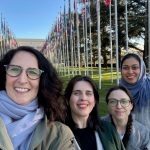The United Nations Human Rights Council’s 52nd session in Geneva concluded this week with some meaningful advances for health and human rights. In addition to the adoption of the landmark resolution on the human right to a clean, healthy, and sustainable environment (A/HRC/51/L.7), the Human Rights Council (HRC) also renewed the mandates for several important accountability mechanisms and advanced consensus on some atrocity crimes. Physicians for Human Rights (PHR) was on hand to urge and coordinate action with special mechanisms, diplomats, commissioners of inquiry, and civil society partners.
The delegation, led by PHR’s new Executive Director Saman Zia-Zarifi, with Intern Zena Ahmed and myself, was in Geneva for the fourth week of this session.
With three new major new reports in hand, PHR prioritized the adoption of recommendations related to Syria, Ukraine, Ethiopia, the United States, as well as the global scourge of indiscriminate and misused crowd-control weapons.
Syria
The dire humanitarian and human rights crises in Syria following 12 years of armed conflict was thrown into stark relief this session, as the meeting opened against the devastation of the February 6 earthquake in Syria and Türkiye. PHR’s new report, She Pays the Highest Price: The Toll of Conflict on Sexual and Reproductive Health in Northwest Syria, co-published with the International Rescue Committee (IRC), Syria Relief & Development (SRD) and the Syrian American Medical Society (SAMS), details how ongoing conflict and targeted attacks on hospitals and health care professionals have fueled a crisis in northwest Syria, severely limiting the availability of and access to life-saving sexual and reproductive health services.
The HRC-mandated Independent International Commission of Inquiry on the Syrian Arab Republic released fresh documentation and analysis at this Council session in a new report, exposing “pervasive violations of human rights and humanitarian law across the country.” It also pointed to the pattern of arbitrary arrests, disappearances and deaths in detention across Syria. The HRC signaled its support for such investigative and truth-telling efforts by adopting a resolution to extend the mandate of the Commission of Inquiry on Syria for one more year. PHR and colleagues took the opportunity to offer information to the Commission to advance its important accountability efforts.
PHR also called on States to extend cross-border authorization for unfettered humanitarian access in advance of the July UN Security Council vote on access to the devastated northwest for the almost 5 million people there in need of emergency assistance.
Ukraine
As Russian shelling against Ukrainian civilians and civilian infrastructure continued into its second year, PHR, together with partners, raised the alarm in Geneva about the perpetuation of a pattern of Russian attacks on health in multiple jurisdictions, including in Ukraine. In a new report, released on the one-year mark of the full-scale invasion of Ukraine, PHR, eyeWitness to Atrocities, Insecurity Insight, the Media Initiative for Human Rights, and the Ukrainian Healthcare Center put a spotlight on ten case studies of attacks on hospitals, ambulances and health care professionals in Ukraine, which constitute war crimes and possibly crimes against humanity. Together with colleagues from Insecurity Insight, the Media Initiative for Human Rights and the Ukrainian Healthcare Center, PHR met with diplomats, investigators and humanitarian groups to help translate these independent findings into accountability for perpetrators.
Ethiopia
The Ethiopian authorities have used the Cessation of Hostilities agreement of November 2022 as a pretext to advance a false narrative that violence there has decreased. Through written and oral interventions, PHR and its partners in the embattled region of Tigray put the Council on notice that in fact atrocity crimes persist, with a particularly troubling pattern of targeting adolescent boys for sexual violence. In that connection, PHR particularly welcomed the extension for three years of the mandate of the UN Special Rapporteur on the sale, sexual exploitation and sexual abuse of children at this Council session.
Global Harms of Crowd-Control Weapons
PHR also raised concern about the health harms of crowd-control weapons and their abuse as documented in a new report, Lethal in Disguise 2: How Crowd-Control Weapons Impact Health and Human Rights, co-authored with the International Network of Civil Liberties Organizations (INCLO) and the Omega Research Foundation. In the wake of protests around the world, such as against the murder of George Floyd in the U.S., and drawing on case studies from Australia, Argentina, Colombia, Hong Kong, India, Israel, Kenya, the U.S. and elsewhere, the report concludes that “Law enforcement and security forces have frequently responded to these protests with excessive force and violence that fundamentally undermine the rights to free expression and assembly.”
UN special mechanisms, the World Health Organization, and States involved in developing an international treaty to control the trade in tools of torture used to suppress peaceful protests and abuse detainees are on notice: since 2015 more than 119,000 people worldwide have reported injuries due to chemical irritants like pepper spray and tear gas and at least 14 people have died from the short-range impact of gas canisters. In Geneva, PHR called on them to ban kinetic impact projectiles (KIPs) and other weapons that are inherently indiscriminate or are misused to cause harm.
PHR put all the powers of evidence and persuasion at its disposal at this HRC session to seek remedies for attacks on health care infrastructure and personnel and other issues at the core of its health-based mandate. We’re committed to building on that momentum in the months ahead.

